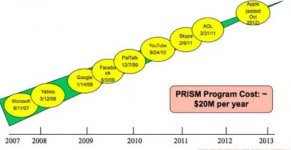@Randy B. Singer....
What's the difference between a company spying on you vs. allowing a third-party to do the same for a handsome amount?
Technically, Google is paying Apple to refrain from creating and offering a Web search engine service. Since such a service is outside of Apple's business model, they are happy to agree to this. Especially since they are being paid well to do so.
Apple doesn't "allow" Google to do anything. They are a separate company, and Apple can't dictate how Google runs their business. Apple could conceivably create their own search engine and compete with Google, thus reducing the number of users subjected to Google's spying, but that would cost Apple a lot of money, and since they don't want to get into the business of spying on their users and selling their information, it would be money thrown away for no return. So, it would make no sense business-wise for Apple to compete with Google in this arena.
Blaming Apple for Google's practices is illogical. Unless you subscribe to the notion that all businesses are conspiring with each other to harm everyone, or that all businesses are inherently evil. Personally I think that those views, while not precisely wrong, are way too extreme.
I find it ironic, that you are so much against A/V software, but then recommend two of them for the Mac. One is licensed, while the other is open source.
You misstate my position. I'm not 100% against AV software (I have commercial AV software running on all of my computers), and I don't exactly "recommend"
any AV software.
To get it out of the way, I use commercial AV software myself because my business demands that I use "best practices" to safeguard client information. To do otherwise might be considered malpractice. Do I think that I "need" AV software. No, I don't. Not at all, in fact. I've been running the commercial version of VirusBarrier for two decades now, and in all that time it has never actually saved me from anything that I needed to be saved from. (It's not that it isn't working. It's flagged a bunch of stuff that I could easily have spotted on my own. It's just that there is so little actual insidious malware for the Macintosh that there has been nothing for it to need to save me from.)
In most cases I actively go around recommending against AV software because the commercial (fully interactive) versions of it (and some similar free versions, such as Sophos) very commonly cause nasty slowdowns and software conflicts. While at the same time there has been extremely little that AV software needs to protect Mac users from. Basically, fully interactive (that is, most commercial) AV software causes way more trouble than it prevents. And, for now, it provides extremely little needed protection.
However, DetectX Swift and VirusBarrier (free edition) are both free, and they don't cause any slowdowns or conflicts, because they aren't fully interactive. DetectX used to be handy to have around a number of years ago when adware was becoming a problem. But the flood of adware seems to have slowed to next to nothing. However, since DetectX Swift is free, it's handy to have on hand if one notices that they are seeing ads pop up when they shouldn't be.
The main utility that I see for VirusBarrier (free edition) is that so many people are so paranoid about malware (because of what they read about Windows in the popular press, or because they were previous Windows users) that having it means that anytime that they are overcome by paranoia they can run it, and they will instantly know that their paranoia is unfounded. Since it is free and it doesn't cause any problems of its own, that makes if worth having around.
When Intego calls their protection "VirusBarrierX9", there's no way to call this software malware protection only, is there?
I'm not sure what you are saying or asking.
I can tell you that Intego has been around for many years now. Up until very recently they were a company that only made software for the Macintosh. (Their software isn't a poor port of a Windows product, and they understand the Macintosh.) Of all of the AV companies, Intego has been extremely aggressive in ferreting out new malware when it arises and pushing out updates to users, often overnight. When you use their software, you can instantly see that it is well designed and it gives you the sense that you are using a quality product.
The biggest downside to VirusBarrier (as it is for most commercial AV software) is that it looks for little to no adware. (Apple is the same way with their built-in anti-malware software in the Mac OS.) I think that's because adware developers can make a legal case that adware isn't really malicious and that it is a legitmate product, and AV software developers don't want to get sued for blocking it. Fortunately DetectX Swift does an excellent job of dealing with adware. It's a great complement to VirusBarrier.
If you needed to trust only one commercial AV software developer, I think that Intego would have to be the one. That's what I've done with my business computers, and Intego has never disappointed me for having made the decision. Do I recommend that you run out and purchase the commercial version of VirusBarrier? Nope. Unless you have a special need case like I do, buying it would be a waste of money.






